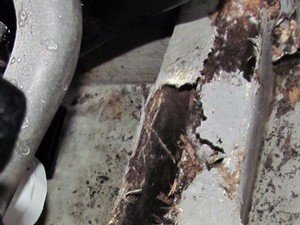I looked at a mid eighties taiwan trawler today. This mfg. is considered the higher end of the tubs. The boat has low hour high dollar motors from 13 years ago. My moisture meter read high moisture content in the deck coring where I could measure from beneath, and high moisture in every stringer and longitudinal I could get the meter on. The cabin top on the port side was also high. Condition everywhere else was a 4-6 out of ten. Boat is still on the hard from last year. It looks like it spent time in Florida and then Texas before that. The boat is currently in fresh water.
I have always wondered.....how much is too much moisture? I am walking from this boat at any price because there is no way I am willing to re-core the stringers and decks. The question is.....do they need to be re-cored? Has anyone ever seen a deck collapse or a stringer fail? I have read about it, but I have never seen it or have known of someone who did. I suppose the survey would suck and you would not get insurance, or at least get another buyer someday who wants a drier boat. I am not interested in salvaging the motors either, but they were REALLY nice. I know to expect window leaks and some moisture issues in these boats. Can anyone help me with a practical limit? Or am I asking a question that cannot be answered? Thank you for your thoughts. Bill
I have always wondered.....how much is too much moisture? I am walking from this boat at any price because there is no way I am willing to re-core the stringers and decks. The question is.....do they need to be re-cored? Has anyone ever seen a deck collapse or a stringer fail? I have read about it, but I have never seen it or have known of someone who did. I suppose the survey would suck and you would not get insurance, or at least get another buyer someday who wants a drier boat. I am not interested in salvaging the motors either, but they were REALLY nice. I know to expect window leaks and some moisture issues in these boats. Can anyone help me with a practical limit? Or am I asking a question that cannot be answered? Thank you for your thoughts. Bill

